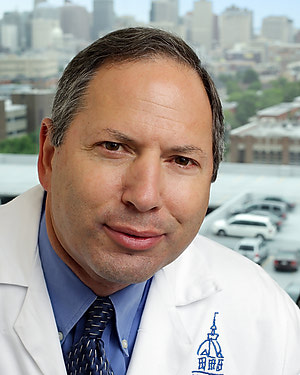Donald Small, MD PhD

- Kyle Haydock Professor of Oncology
- Professor of Oncology
Expertise: Pediatric Hematology Oncology

Expertise: Pediatric Hematology Oncology
It isn't every day a gene is cloned, let alone one that plays a paramount role in a common form of pediatric leukemia.
But back in 1992, that's precisely what happened in the laboratory of Donald Small, M.D., Ph.D. It turns out that the gene, dubbed FLT-3, is linked to acute myelogenous leukemia (AML)—one of the most common blood cancers in children and adults.
Dr. Small describes the consequences of the FLT3 mutation this way. "It's like someone constantly pushing a gas pedal, telling these leukemia cells to grow," he says. Once Dr. Small and his research team discovered the gene responsible for AML growth, they committed to the next step: stopping it in its destructive tracks.
Since then, Dr. Small and his colleagues have identified small molecules able to "turn off" the FLT3 gene receptor, target and kill the cancer cells, and leave the normal blood cells unharmed. Currently, these drugs, called FLT3 inhibitors, are being tested in clinical trials to examine their effectiveness in children and adults with FLT3-mutant AML, and in infants with acute lymphocytic leukemia (ALL).
"It's an exciting period in research because we're finding mutant genes that cause cancer and have existed since the beginning of time. Once we find them, we can develop drugs specific to their mutations, which should leave normal cells alone. It will enable us to improve cure rates, and decrease treatment side effects. It's really the molecular era," Small says.
Dr. Small admits researchers are a long way off from discovering the entire spectrum of gene mutations that cause pediatric tumors. But he's encouraged by the progress made in the last few decades, and expresses confidence that scientists will uncover the spectrum of gene mutations within the next ten years. "Once we know the makeup of the tumors, we'll be able to develop drugs that attack these mutations," he says. "Eventually, patients with cancer will have their tumors sequenced and we will treat them with drugs appropriate for their unique tumor."
Though Dr. Small's research plays a prominent role in his profession, the muse for his work lies not in the laboratory, but in the pediatric oncology ward. "I was attracted to pediatrics because kids are so innocent of the disease; they've done nothing to contribute to its onset," he says.
Just as pediatric oncology patients drew Dr. Small to this specialty, they continue to keep him focused on the mission. "These kids are really heroic. No matter what's happening to them they stay positive. They really serve as our inspiration, and remind us of why we get into the laboratory and do what we do," he says.
Donald Small, M.D., Ph.D., is the inaugural Kyle Haydock Professor and the Director of Pediatric Oncology at Johns Hopkins. As a six-year-old confined to a hospital bed with, Kyle Haydock's favorite writer was Tom Clancy. Kyle’s grandfather wrote a fan letter on the boy’s behalf to Mr. Clancy, and Mr. Clancy wrote back. The two became close friends and visited Disney World together (the photo shows them at Disney World) before Kyle's untimely death two years later of sarcoma. “Kyle,” wrote Mr. Clancy in an essay included in the book Fighting Chance, “was my little buddy–not a distant abstraction at all, a real kid my son's age, bright and funny and perceptive.” Mr. Clancy calls cancer a war: “The children fight back as victims who want to live normal lives in the face of this most sinister and cruelest of maladies… Meanwhile, all around them the best minds and tools the medical profession has evolved are marshaled like an army to fight the war." This professorship will support the important cancer research of a leader in the field of pediatric oncology.
Tom Clancy remains one of the best-selling authors of his generation. His first book, The Hunt for Red October, was an astounding success, and Mr. Clancy went on to write many more internationally bestselling novels. He funded two professorships at Johns Hopkins. One supports the important cancer research of a leader in the field of pediatric oncology, and the second recognizes the excellence of medical and patient care in the treatment of vision loss. Mr. Clancy died in 2013.